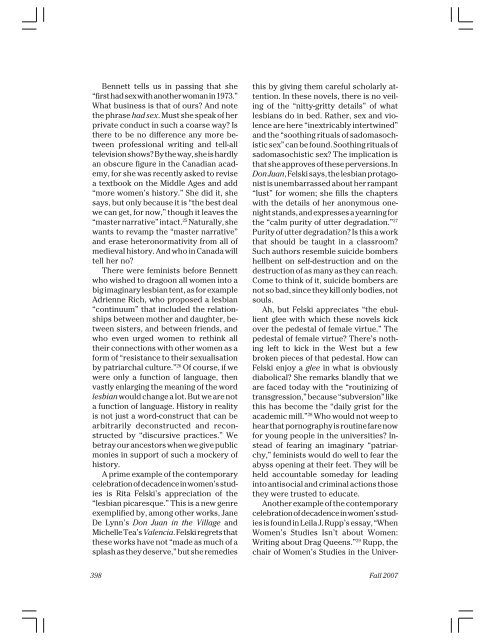Feminist Literary Criticism: From Anti-Patriarchy to Decadence
Feminist Literary Criticism: From Anti-Patriarchy to Decadence
Feminist Literary Criticism: From Anti-Patriarchy to Decadence
You also want an ePaper? Increase the reach of your titles
YUMPU automatically turns print PDFs into web optimized ePapers that Google loves.
Bennett tells us in passing that she<br />
“first had sex with another woman in 1973.”<br />
What business is that of ours? And note<br />
the phrase had sex. Must she speak of her<br />
private conduct in such a coarse way? Is<br />
there <strong>to</strong> be no difference any more between<br />
professional writing and tell-all<br />
television shows? By the way, she is hardly<br />
an obscure figure in the Canadian academy,<br />
for she was recently asked <strong>to</strong> revise<br />
a textbook on the Middle Ages and add<br />
“more women’s his<strong>to</strong>ry.” She did it, she<br />
says, but only because it is “the best deal<br />
we can get, for now,” though it leaves the<br />
“master narrative” intact. 25 Naturally, she<br />
wants <strong>to</strong> revamp the “master narrative”<br />
and erase heteronormativity from all of<br />
medieval his<strong>to</strong>ry. And who in Canada will<br />
tell her no?<br />
There were feminists before Bennett<br />
who wished <strong>to</strong> dragoon all women in<strong>to</strong> a<br />
big imaginary lesbian tent, as for example<br />
Adrienne Rich, who proposed a lesbian<br />
“continuum” that included the relationships<br />
between mother and daughter, between<br />
sisters, and between friends, and<br />
who even urged women <strong>to</strong> rethink all<br />
their connections with other women as a<br />
form of “resistance <strong>to</strong> their sexualisation<br />
by patriarchal culture.” 26 Of course, if we<br />
were only a function of language, then<br />
vastly enlarging the meaning of the word<br />
lesbian would change a lot. But we are not<br />
a function of language. His<strong>to</strong>ry in reality<br />
is not just a word-construct that can be<br />
arbitrarily deconstructed and reconstructed<br />
by “discursive practices.” We<br />
betray our ances<strong>to</strong>rs when we give public<br />
monies in support of such a mockery of<br />
his<strong>to</strong>ry.<br />
A prime example of the contemporary<br />
celebration of decadence in women’s studies<br />
is Rita Felski’s appreciation of the<br />
“lesbian picaresque.” This is a new genre<br />
exemplified by, among other works, Jane<br />
De Lynn’s Don Juan in the Village and<br />
Michelle Tea’s Valencia. Felski regrets that<br />
these works have not “made as much of a<br />
splash as they deserve,” but she remedies<br />
this by giving them careful scholarly attention.<br />
In these novels, there is no veiling<br />
of the “nitty-gritty details” of what<br />
lesbians do in bed. Rather, sex and violence<br />
are here “inextricably intertwined”<br />
and the “soothing rituals of sadomasochistic<br />
sex” can be found. Soothing rituals of<br />
sadomasochistic sex? The implication is<br />
that she approves of these perversions. In<br />
Don Juan, Felski says, the lesbian protagonist<br />
is unembarrassed about her rampant<br />
“lust” for women; she fills the chapters<br />
with the details of her anonymous onenight<br />
stands, and expresses a yearning for<br />
the “calm purity of utter degradation.” 27<br />
Purity of utter degradation? Is this a work<br />
that should be taught in a classroom?<br />
Such authors resemble suicide bombers<br />
hellbent on self-destruction and on the<br />
destruction of as many as they can reach.<br />
Come <strong>to</strong> think of it, suicide bombers are<br />
not so bad, since they kill only bodies, not<br />
souls.<br />
Ah, but Felski appreciates “the ebullient<br />
glee with which these novels kick<br />
over the pedestal of female virtue.” The<br />
pedestal of female virtue? There’s nothing<br />
left <strong>to</strong> kick in the West but a few<br />
broken pieces of that pedestal. How can<br />
Felski enjoy a glee in what is obviously<br />
diabolical? She remarks blandly that we<br />
are faced <strong>to</strong>day with the “routinizing of<br />
transgression,” because “subversion” like<br />
this has become the “daily grist for the<br />
academic mill.” 28 Who would not weep <strong>to</strong><br />
hear that pornography is routine fare now<br />
for young people in the universities? Instead<br />
of fearing an imaginary “patriarchy,”<br />
feminists would do well <strong>to</strong> fear the<br />
abyss opening at their feet. They will be<br />
held accountable someday for leading<br />
in<strong>to</strong> antisocial and criminal actions those<br />
they were trusted <strong>to</strong> educate.<br />
Another example of the contemporary<br />
celebration of decadence in women’s studies<br />
is found in Leila J. Rupp’s essay, “When<br />
Women’s Studies Isn’t about Women:<br />
Writing about Drag Queens.” 29 Rupp, the<br />
chair of Women’s Studies in the Univer-<br />
398 Fall 2007
















